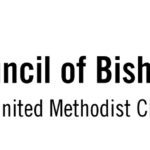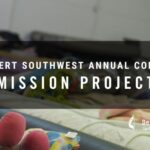By Billie K. Fidlin, Director of Outreach & Justice; Rev. Kimberly Scott, Crossroads UMC; Ella Rawls, AZ JFON
The Sessions Committee of the Desert Southwest Conference which is the planning body for Annual Conference agreed at the end of last year that our mission project would be DACA/Undocumented scholarship funding. Dollars collected will be used to help students pay for the college education & related expenses through The United Methodist Foundation as funded by the Annual Conference mission offerings.
We hear the voice of the Holy speaking throughout the Bible to us about those who have traveled to a new land – to help, to aid, to be present for all the right reasons. These scripture passages are present with us today as we live in a changing world.
“Boaz replied, “I’ve been told all about what you have done for your mother-in-law since the death of your husband – how you left your father and mother and your homeland and came to live with people you did not know before. May the Lord repay you for what you have done. May you be richly rewarded by the Lord, the God of Israel, under whose wings you have come to take refuge.” Ruth 2:11-12
What follows are some of the Frequently Asked Questions to help us understand why The Long Journey mission project is needed and so important.
Frequently Asked Questions
Who is a DACA student?
https://diversity.iupui.edu/170825-DACA-Facts.pdf
The acronym DACA stands for Deferred Action for Childhood Arrivals. It is a Department of Homeland Security policy that allows for certain undocumented Americans to have their deportations delayed and obtain a temporary work permit.
Eligible people must have been age 30 or younger as of 2012, enrolled in or graduated from school, and not have a felony conviction. Individuals submit to a background check and pay $495 in fees as part of their application process. DACA lasts for 2 years and each renewal costs an additional $495 and is not guaranteed. DACA recipients are required to pay federal income taxes.
Undocumented students have even less opportunity for financial assistance.
DACA Students:
- 95% are individuals currently working or in school
- 63% got a better paying job
- 54% bought their first car
- 48% got a job with better working conditions
- 12% bought their first home
DACA recipients contribute $1.2 billion annually in federal, state, and local tax revenue. That revenue would disappear if DACA were repealed.
Because of Undocumented individuals the economic impact in our Conference and beyond:
According to the New American Economy, roughly 41% of all undocumented migrants are from Mexico. In 2019 Mexican undocumented migrants contributed the following:
In Arizona:
- $194 million in federal income taxes
- $167 million in state and local taxes
- $438 million in social security contributions
- $103 million in Medicare contributions
In Nevada
- $134 million in federal income taxes
- $81 million in state and local taxes
- $286 million in social security contributions
- $67 million in Medicare contributions
Nationally
- $5.4 billion in federal income taxes
- $4.4 billion in state and local taxes
- $11.7 billion in social security contributions
- $2.8 billion in Medicare contributions
Here is a link to the report: https://research.newamericaneconomy.org/report/contributions-of-undocumented-immigrants-by-country/
Are DACA & undocumented students edible for scholarships through the federal scholarship process?
In general – the answer to this is no. As a DACA student, you are not eligible for federal student loans. While DACA students can go to college in the U.S. they are generally ineligible for federal student loans/student aid.
In-State Tuition for DACA Students in our Conference?
Today, DACA recipients pay 150% of in-state tuition in Arizona. Undocumented students pay even higher rates. Arizona is one of three states (Georgia and Indiana) that specifically passed legislation prohibiting undocumented students from receiving in-state tuition rates (2021).
In Nevada, undocumented and DACA students who have graduated from a Nevada high school are eligible for in-state tuition.
If DACA students can receive some scholarship dollars, why do they need our Conference help?
The scholarship money that students receive typically does not cover their tuition, fees, and living expenses. The majority of these students come from low-income families and would qualify for grants and other federal aid but because of their DACA and immigration status, they do not.
###
You can support the 2022 Annual Conference Mission Project, “The Long Journey” by donating online at https://bit.ly/2022MissionProject or mailing checks to Desert Southwest Conference at P.O. Box 32830, Phoenix, Arizona 85064. Please enter 2022 Mission Project in the memo line. Thank you for your support. Questions about the mission project may be sent to Billie Fidlin, Director of Justice & Outreach at bfidlin@dscumc.org.





